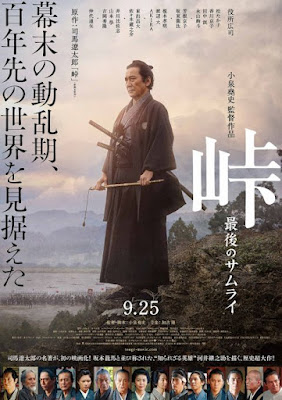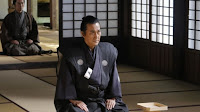Forget about Tom Cruise. In Japan, Tsuginosuke Kawai is often regarded as the last samurai. At the end of the Shogunat era, his Nagaoka clan found itself caught between forces loyal to the Shogun and the newly restored emperor. He wanted to avoid a fight, but the Boshin War draws him in anyway in Takashi Koizumi’s The Pass: The Last Days of the Samurai, which screens live-and-in-person during the 2021 Japan Cuts Festival of New Japanese Film, at the Japan Society.
Kawai is the Nagaoka Clan’s chief retainer. Given his lord’s advanced years, he is also the de facto strategist and decision-maker. He tries to remain neutral after the Shogun’s abdication, but the two warring factions just won’t have it. Reluctantly, Kawai assumes command of an alliance of smaller clans, even though he suspects their efforts will ultimately prove futile. However, they might have a prayer of survival, if they continue to hold the strategic Enoki Pass. Whoever controls the pass controls Nagaoka Castle.
Pass is a terrific samurai film that is rife with tragic Shakespearean overtones, which makes sense, given Koizumi was the assistant director on Kurosawa’s Ran. Hardnosed Koji Yakusho (the star of Takashi Miike’s 13 Assassins and Hara-Kiri) is instantly credible and immensely compelling as the shrewd, but world-weary Kawai. In many ways, you could consider this a samurai equivalent to Eastwood’s late-career cowboy movies. He also perfectly personifies Ivan Morris’s conception of the “Nobility of Failure” in Japanese history and culture.
Yakusho also shares some keenly poignant chemistry with Takako Matsu, playing his eternally patient wife, Osuga. Their marriage is not perfect, but it endures. As added bonuses, the legendary Tetsuya Nakadai and Kyoko Kagawa turn up in small parts. However, there is no question Yakusho owns the film, body and soul.
Koizumi helms several battle sequences that are heavy on the carnage, but the vibe of Pass is always deeper and heavier than a mere action film. It is literally all about the end of an era. Yet, even though we understand the tides of history are flowing against Kawai, Yakusho is so stone-cold steely, Pass is still a great deal of fun to watch. Throughout it all, it is easy to see why people followed him into battle, despite being out-numbered, hundreds of times over.
Pass is a big, sweeping historical, but it is Koizumi’s quiet moments that really make the film sing. This is exactly kind of film fans of Japanese cinema, particularly samurai films, fell in love with in the first place. Very highly recommended, The Pass: Last Days of the Samurai screens tomorrow (8/21) and Wednesday (9/1), as part of this year’s Japan Cuts.

